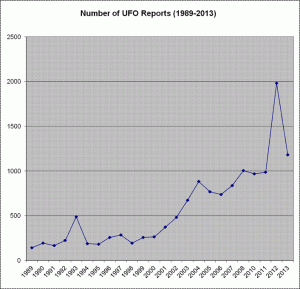UAP Observations Reporting Scheme spoke recently with Chris Rutkowski about Canadian Ufology. Last March, he published the 2013 Canadian UFO Survey on the following website: http://www.canadianuforeport.com/survey/essay/2013essayv2.html.
Data for that yearare available there, as well as various charts and graphs. Chris Rutkowski also mentioned to us that 2014 is also the 25th yer of the Canadian UFO survey and that a separate 25-year compilation that will be published later…
“…Any exploration into unusual phenomena must be handled with objectivity and common sense. This is easy in theory, but in practice it tends to be difficult. I tried to be objective when I first began my study of strange phenomena. It wasn’t easy. My studies in the sciences did not include allowances for debatable phenomena such as Sasquatch, lake monsters and ghosts. But after pursuing reports of such things, I found myself confronted with a basic question: How can a scientist deal with reports of things unaccepted by science? This problem resulted in the classic Catch‑22 of Fortean research. Scientists tend to ignore reports of spurious phenomena, so research is inevitably done by laypeople. However, their research is not sanctioned by scientists and is sometimes below acceptable standards, so scientists have no choice but to reject the results.
My educational background was in science, with astronomy as my area of specialization. I now give public and private presentations on various aspects of science education, and I enjoy spreading the news that science is interesting. I especially treasure the faces of children who beam with pride as they understand a new science concept such as magnetism or gravity. But I know that science still holds many mysteries, and I encourage children to ask questions continually throughout their schooling. I don’t remember how I became interested in strange phenomena. But at some point I started reading and collecting stories of scientific curiosities. I wanted to learn as much as I could about Fort’s “damned”. Perhaps because of my astronomical studies, I took a special interest in UFOs and the speculation that there might be other creatures besides us in the universe. I found that the more I read and the more I corresponded with others with the same interest, the more questions I had. I have attended seances, spoken with people who have seen ghostly apparitions walk up stairs, listened as a farmer described the glowing flying saucer that landed in his field, and marveled as I was told of an eight‑foot‑tall humanoid covered with hair and emitting a foul smell. Even with an enormous grain of salt at my side, one thing has impressed me above all: the sincerity of the witnesses. Without any reason to lie, and usually under risk of being ridiculed by their peers, thousands of people have told me of their strange experiences and encounters with things that shouldn’t be at all. But I believe that everyone who claims to have seen a UFO has in fact had a real experience of some kind. I make no assumptions regarding its origin on a distant planet or the astral plane; I am simply an investigator, and am willing to listen to those who have had a mysterious experience.
What are the conclusions to be drawn from the last years Canadian UFO surveys ?
The main conclusions are that: 1) UFO sightings continue to be reported by the general population; and 2) the number of reported UFOs has been trending upward since 1989. In 2013, there was the second-highest number of reports ever recorded.
In Canada, what is the attitude vs. the UFO topic (i.e. the general public, scientists, the authorities and military forces) ?
As with all industrial and developed countries, UFOs and the idea of alien life continue to be pervasive in the public mind. Popular culture is very much taken with the issue of alien intervention, whether it is something as blatant as the Roswell mythology or Hollywood’s current fascination with invading aliens in the Marvel Universe of The Avengers. Canadians are no different than people in other countries. Polls have shown that about 10% of the North American population, including Canada, believe they have seen UFOs. By demographics alone, this means more than 3.5 million Canadians think they have seen UFOs. But as with other countries, the official view adopted by science is that the subject is foolish and not worth studying.
Is there any differences between American and Canadian UFO cases, or their characteristics ?
Not that I can detect. Although there has not been any American study comparable with the Canadian survey, UFO reports seem to ne very analogous in both countries.
What have been the most (unexplained) intriguing Canadian UFO cases ?
That is a difficult question! We are just in the last stages of completing a 25-year study of UFOs in Canada, and will produce such a list some time later this year.
 But I can easily note some of the most remarkable of all time: the Falcon Lake case and the Shag Harbour case, both from 1967; the Yukon case of 1996; and the Langenburg case of 1974.
But I can easily note some of the most remarkable of all time: the Falcon Lake case and the Shag Harbour case, both from 1967; the Yukon case of 1996; and the Langenburg case of 1974.
Has there been any evolution in the statistics during the last 10 years location, shape, duration, characteristics, etc…
Not in the last 10 years, but during the last 25 years, we have seen the number of physical trace cases dwindle to almost nothing. In the 1970s and 1980s, it was common to have “landing traces” and other physical effects reported in conjunction with UFO sightings. Such things are very rare now. Also, discoveries of “crop circles” rose and declined during the past 25 years; thankfully, there are few reported anymore. Another trend has been the disappearance of the “saucer” or “disc” as a shape in reports. While “triangles” became common for some time, the most common “shape” of the past several years is simply a “point source” of light. In other words, the numbers of sightings of structured objects has declined greatly.
Why Science should take another look at the UFO Phenomena?
Because of the persistence of the phenomenon, for one thing. My opinion is that if UFOs are not physical phenomena, they definitely are sociological or psychological phenomena. In either case, they are worth scientific study, because they have, at the very least, permeated the minds and imagination of the populace – if they are not physical phenomena.
Most scientific objections to the study of UFO reports center around the concept of alien visitation. This is a “red herring,” in my opinion. The topics of UFOs and aliens are separate, but MAY be related. Through my training in astronomy, I share the majority view that intelligent life exists elsewhere in our galaxy (but not necessarily here on Earth!). I believe it possible that an advanced, technological civilization may have found ways of traversing interstellar distances without violating physical laws. However, after more than 35 years of research and investigation, I do not see any incontrovertible evidence of this.
I will also note that our lack of conclusive evidence of alien visitation is exactly what we would expect from an advanced extraterrestrial technological civilization. This has been phrased by some researchers as: “Absence of evidence is not evidence of absence.” Unfortunately, our current scientific methodology precludes such an approach to studying our universe. We generally require testable evidence or proof to support a premise or theory. Under this scientific paradigm, there are no aliens.
How do you think could this could be undertaken ? Do you believe that any a-priori detection effort should be implemented ?
This is difficult because of the scientific approach I just noted. I believe that the objective study of heteroclitic phenomena and the analysis of such data is not sufficient by itself. But engaging in reasoned discussion with scientists, without any usual UFO/alien/mystical rhetoric, may be the key to moving forward in serious discourse on anomalistic phenomena. I also think that the most serious hindrance to UFO-related research is the lack of investigation of UFO reports. I calculate that less than 5% of all UFO sightings are adequately investigated. It is difficult to imagine how the UFO phenomenon could ever be made convincing to science without good data collection and in-depth investigation.
Finally,May I ask what is your personal opinion about the UFO phenomena ?
I am interested in bridging the chasm between “believers” and “debunkers” in an attempt to catalyse rational discourse on these topics. I know that, deliberately or otherwise, incorrect information has been propagated by individuals who have made “names” for themselves in these fields of study. Because of some training in deconstructionist educational theory, I am critical of published research and popular interpretations of the phenomena.
My philosophy: “Don’t always believe the believers, but also be skeptical of skeptics!”
Many thanks Mr Rutkowski for your time and all the best luck for your future UFO researches.
For illustration purposes, a recent presentation given by Chris Rutkowski: UFO Phenomena in Canada_CR presentation 2014
His blog can be found at: http://uforum.blogspot.nl/

